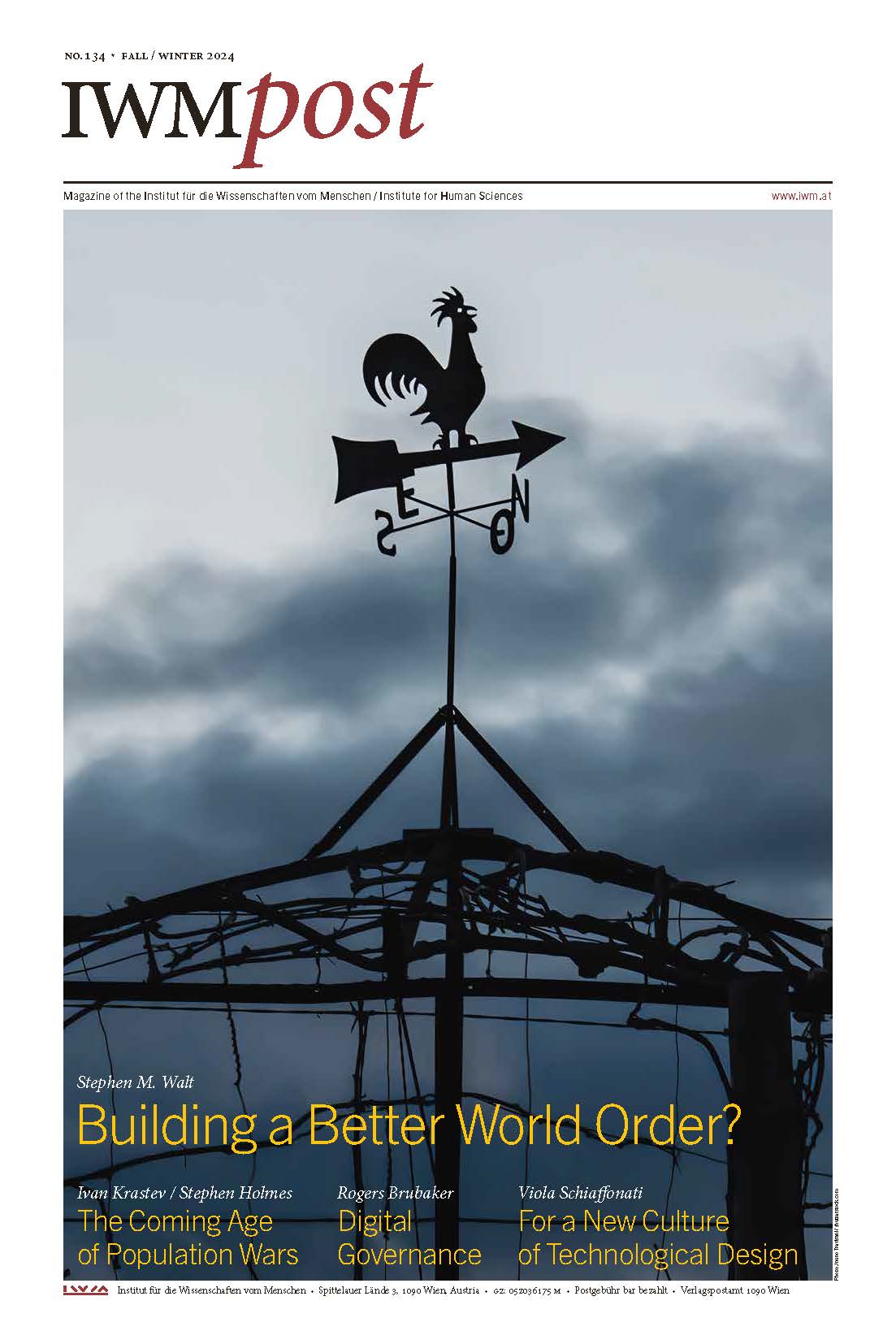The central text of the present issue responds to an urgent problem of our time. At a historical moment when the world order established after the Second World War is increasingly crumbling and being challenged, international relations expert Stephen Walt outlines the key elements of and the path toward a possible better world order.
The focus on politics includes three further essays: Ivan Krastev and Stephen Holmes link war and the nightmare of depopulation, Francesca De Benedetti warns against an Orbanization of Europe by Giorgia Meloni, and Kristina Broučková develops a differentiated view of the relationship between elections and democracy.
Four essays deal with questions of digital technology and artificial intelligence. Rogers Brubaker explains the relationship between digital technocracy and populism, Viola Schiaffonati calls for a critical discussion on the design choices in digital technologies, and Erich Prem and Angelika Adensamer point to the limits of artificial intelligence and warn against its unreflective application by state authorities.
The philosophical essays of the issue address Jan Patočka's reflections on a post-European world (James Dodd), the notions of witness (Marek Kettner) and perspective (Jakub Čapek), the Hegelian politics of contradiction (Bartosz Wójcik), and the reception of Kant in India (Manidipa Sanyal and Subhoranjan Dasgupta).
In a section on memory and history, Łukasz Kiełpiński points to the “memoir fever” in 20th century Poland and Anna Narinskaya offers us an insight into the lives of Jewish converts in the Soviet Union through her own family memories. Further, Ola Hnatiuk draws attention to research gaps in the study of Austrian-Soviet relations during the Ukrainian Holodomor of 1933, Michał Narozniak discusses sexual modernity in Galicia, and Georgios Varouxakis traces the origin and development of the idea of the West.
Dragan Đunda and Tendai Ganduri address sociological and political implications of infrastructure projects and issues.
Finally, we point to the IWM publication The Balkans: Mission Possible by Maria Todorova, which is to be released by Mandelbaum Verlag in the spring of 2025.
I hope you enjoy the read!
Evangelos Karagiannis
Download the IWMpost 134 as a PDF
Contents
POLITICS
Building a Better World Order? / by Stephen M. Walt
Giorgia Meloni Is Orbánizing the EU / by Francesca De Benedetti
The Coming Age of Population Wars / by Ivan Krastev and Stephen Holmes
“The Siren of Democracy” / by Kristina Broučková
PHILOSOPHY
After Europe / by James Dodd
Who Is a Witness? / by Marek Kettner
Perspectivism in the Post-Truth Era / by Jakub Čapek
The Hegelian Politics of Contradiction / by Bartosz Wójcik
Homage to Kant in Kolkata / by Manidipa Sanyal and Subhoranjan Dasgupta
DIGITAL TECHNOLOGY
For a New Culture of Technological Design / by Viola Schiaffonati
Digital Governance: Between Populism and Technocracy / by Rogers Brubaker
Digitaler Gesetzeszwang / von Erich Prem
Whatever Works? Künstliche Intelligenz in einer komplexen Welt / von Angelika Adensamer
INFRASTRUCTURE
Mediating Climate Voices for a Sustainable Agenda / by Tendai Ganduri
Hydropower Capabilities: Doing Politics Through Infrastructure / by Dragan Đunda
HISTORY AND MEMORY
Die ukrainische Hungerkrise von 1933 und Österreich / von Ola Hnatiuk
Meine Großmutter, das Judentum und die Orthodoxie / von Anna Narinskaya
“Memoir Fever” in 20th Century Poland / by Łukasz Kiełpiński
Galicia: A Forgotten Cradle of Sexual Modernity / by Michał Narożniak
What Is the West and Where Did It Come From? / by Georgios Varouxakis
PUBLICATIONS
Maria Todorova's Der Balkan: Mission Possible / von Evangelos Karagiannis
